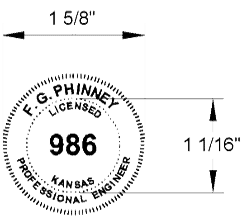CEU Requirements for Kansas Professional Engineers
Licensed professionals often ask us “What are the continuing education requirement for Kansas professional engineers?”
Professional engineers (PE) in Kansas must complete 30 professional development hours (PDH) of continuing education biennially to renew their licenses. PEs with last names beginning with A through L must renew the licenses by April 30 on even numbered years. PE’s with last names beginning with M through Z, must renew their licenses by April 30 on odd numbered years. As many as 30 PDH can be carried forward to the subsequent renewal cycle. There are no required ethical, technical or managerial subjects PEs must study for biennial PDH for license renewal. However, PDH dealing with technical competency, safety, health and welfare issues are encouraged.
Kansas professional engineers can earn all required PDH credits by completing our state-specific packages.
We prepared a summary of all license renewal requirements for Kansas PEs.
Kansas Required PE PDH Credits
The Kansas State Board of Technical Professions (KSBTP) requires PEs renewing their licenses biennially to complete 30 PDH through continuing education courses and activities. The board doesn’t pre-approve specific continuing education courses, activities or providers. However, PEs must ensure their PDH courses and activities strengthen or maintain their ethical, managerial and technical competency, address issues related to public health, safety and welfare and will be approved by the board. PEs can renew their licenses online but must retain proof they completed their PDH for 4 years.

Kansas Engineering License Renewal Dates
PEs with last names beginning with A to L must renew their licenses by April 30 on even-numbered years. PEs with last names beginning with M to Z must renew their licenses by April 30 on odd-numbered years. Proof they completed the required 30 PDH must be kept for 4 years.
Engineering Ethics and Professional Conduct
The KSBTP doesn’t require PEs to complete their PDH continuing education courses on Kansas engineering laws and rules, professional conduct and ethics. However, it’s recommended PEs use their PDH on continuing education courses and activities with content relevant to technical, ethical, managerial, safety, health and welfare issues involved in practicing engineering in Kansas.
Section 5 – Records Keeping Requirements for Engineers
PEs in Kansas must keep PDH course and activity completion evidence including attendance verification records, certificates of completion, signed attendance receipts, lists of all course or activity attendees signed by the course or activity leader, NCEES CPC reports, AIA transcripts and any other documentation verifying attendance and the number of PDH credits earned. Those records must be kept for 4 years and presented to the board upon request during an audit.
Continuing Education Activities Accepted by the Kansas Board
The types of courses and activities accepted by the board for PDH credit include:
- Online courses for up to 30 PDH
- Live Webinars that increase PEs knowledge and ability to work
- Self-study or self-directed courses enhancing engineering knowledge or practice
- College courses dealing with technical and design subjects or business practices
- Actively participating in short university courses or interactive seminars covering technical and design subjects
- Technical presentations at conventions or seminars on materials use and function
- Short courses or seminars on business related practices or new technology offered by professional organizations, system suppliers, colleges or universities
- Professional services to the public on boards, committees or commissions using engineering expertise
- Preparing for and teaching technical or design courses or seminars
- Writing articles, books and papers from technical or design research published in trade magazines or technical journals
- Actively participating in technical or professional societies
- Serving as committee members or officers of organizations or technical societies
- Serving as sponsors or mentors for the NCARB’s Architectural Experience Program
- Correspondence courses, tutorials, workshops, in-house corporate technical and design education and training programs
Courses or Activities Not Accepted for PDH in Kansas
The following are some courses and activities the board doesn’t accept for PDH credit:
- Regular employment
- Real Estate licensing courses
- Non-technical computer software courses
- Estate, financial or personal planning
- CPR/First Aid courses
- Personal self-improvement
- Trade show displays or equipment demonstrations
- Service club activities or meetings
- Topics not relevant to engineering
- Enrolling in but not attending courses and seminars
- Attending the same course repeatedly
- Teaching the same course repeatedly
- Attending general business or committee meetings
- Conversational language courses designed for personal use
- Touring buildings, museums, site development, structures and schools without the clear objective of strengthening or maintaining competency in engineering technology or design
Pre-Approval of Continuing Education Activities
KSBTP doesn’t require pre-approval of continuing education providers, activities or courses used for PDH. It’s the responsibility of PEs to ensure the course or activity enhances their professional, technical, managerial or ethical knowledge or skills, addresses issues related to public health, safety and welfare and meets KSBTO’s approval.
Section 8 – Sources of Free Continuing Education Courses
There are many organizations offering PEs in Kansas free continuing education courses to earn their 30 biennial PDH to renew their licenses. Sources of free courses include:
Kansas Engineering Licensing Requirements
Becoming a licensed PE in Kansas is a multi-step process. Candidates must earn a four-year engineering degree at an ABET-accredited institute of higher learning. Candidates must then pass the NCEES administered Fundamentals of Engineering (FE) exam. PE candidates must then work under the supervision of a PE for at least 4 years.
After completing the internship, engineers must pass the NCEES administered Principles and Practice in Engineering (PE) exam. After successfully completing these steps, the engineer can apply to the KSBTP for a license to serve as a PE in Kansas.
Complete Engineering Packages for Kansas
 We developed Continuing Education Packages for Kansas professional engineers that include all required credits. These packages are guaranteed to be accepted by KSBTP. We off packages for chemical, civil, electrical, environmental, geotechnical, mechanical, and structural engineers.
We developed Continuing Education Packages for Kansas professional engineers that include all required credits. These packages are guaranteed to be accepted by KSBTP. We off packages for chemical, civil, electrical, environmental, geotechnical, mechanical, and structural engineers.
Engineering Discipline Restrictions for Continuing Education Courses
The KSBTP doesn’t limit or restrict the courses PEs can take for PDH to renew their engineering licenses. However, the continuing education courses or activities must enhance the PE’s knowledge and skill level and better prepare them to provide engineering services.
Protecting the Public
The process for becoming a licensed PE and renewing one’s license in Kansas biennially is designed to protect the safety, health and well-being of the general public.
